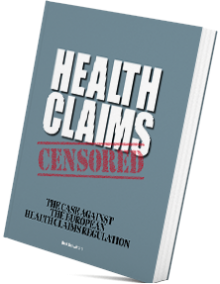31 January 2014
In Scientism, Legalism and Precaution, [1] the authors contend that the Nutrition and Health Claims Regulation (NHCR) not only stifles scientific research into the relation between nutrition and health, but also hinders Europe’s public health and advances dietary ignorance.
The NHCR tries to establish a Europe-wide market harmonisation regarding the use of health claims in commercial communications concerning food and food products. It envisions to honour the precautionary high level of protection for consumers through the scientific establishment of health claims whereby, so it is thought, misleading information on food products will, in all intents and purposes, be eliminated. Health claims as scientifically established by EFSA’s NDA Panel purportedly would prevent misleading information that might be damaging to Europe’s public health.
To connect dietary patterns and foods (including food supplements and fortified foods) with human health and thereby assess benefits and risks, methods such as observational epidemiologic studies, intervention trials (especially Randomised Controlled Trials – RCTs), models and simulations, in and ex vivo animal and human studies, in vitro research, and the like, have been developed and are used. From a political, regulatory and (mainstream) scientific point of view, the RCT is overarchingly regarded as the ‘gold standard’ for connecting nutrition and health. Indeed, Regulation 353/2008/EC identifies in the “organisation of pertinent scientific data” a “hierarchy of study design” where RCT’s rank at the top of this ostensible scientific pyramid.
RCTs thus are given legal sanction and preference with respect to the approval or rejection of certain health claims for certain foods or food products. Accordingly, the European legislature has standardised the scientific inquiry into nutrition and health claims, with the EFSA as its monitoring body. This flawed and counter-productive approach hinges on the serious “category-mistake” that equals “misleadingness” with the uncertainty that is inherent in the scientific quest for knowledge and insight.
One of the main appeals of the RCT is that the how-question need not be answered, and as such will not and cannot be clarified by the RCT. In other words, how (and why) certain treatments or agents give certain results might not necessarily be known, other than the fact that a certain result is actually obtained. Clearly, RCTs in the field of nutrition science are undertaken in view of evidence already gathered in other research. One cannot and does not do a RCT in the blind. Nonetheless, RCTs themselves are not in the business of elucidating the how and the why of the observed effect(s) of a certain agent under scrutiny in the trial.
Answering the questions on how things work and why is the quintessence of science. RCTs themselves do not further mechanistic knowledge, although that knowledge is usually available before any RCT is attempted. Moreover, if the results of RCTs cannot be readily extrapolated, then the lack or absence of mechanistic knowledge exacerbates ignorance: put in the agent – a food component – and out come(s) the effect(s) without the RCT as such being able to elucidate the underlying mechanism(s). Indeed, the concrete regulatory focus on RCTs as a primary means to acquire some health claim will hamper that search.
As Regulation 353/2008/EC puts RCTs at the top of some scientific hierarchy, policymakers and regulators can take a free ride with respect to RCT-outcomes (positive or negative), while literally nobody may or must know why those outcomes are what they are. This is quite contrary to how for instance technology is dealt with. While most of the general public have no clue how mobile phones work and are comfortable with the fact that they work, there are people who know exactly how mobile phones operate: the designers, electro-technicians, and so on. For the science of nutrition and health it should be the same: someone should know why the food compound under (RCT) study has the observed health effect. In sum, executing an RCT, or indeed multiple such studies, seems very much like trying to learn the laws of electricity by switching on the lights.
Ironically then, the possibilities to know whether the NHCR itself works is undermined by its very structure and terms of reference. At its core it unhesitatingly proliferates ignorance. Concentrating on RCTs as the NHCR does, the regulatory message is that the question whether, how and why the policy intervention does or doesn’t work is made not to matter! Science thus is incontrovertibly misappropriated to obstruct the very proliferation of knowledge regarding nutrition and health. Advancing ignorance concerning the relation between diet and health, as an a priori for regulating nutrition and health claims, surely is counterintuitive, counterproductive and detrimental in terms of the provision of information to consumers.
Bert Schwitters




